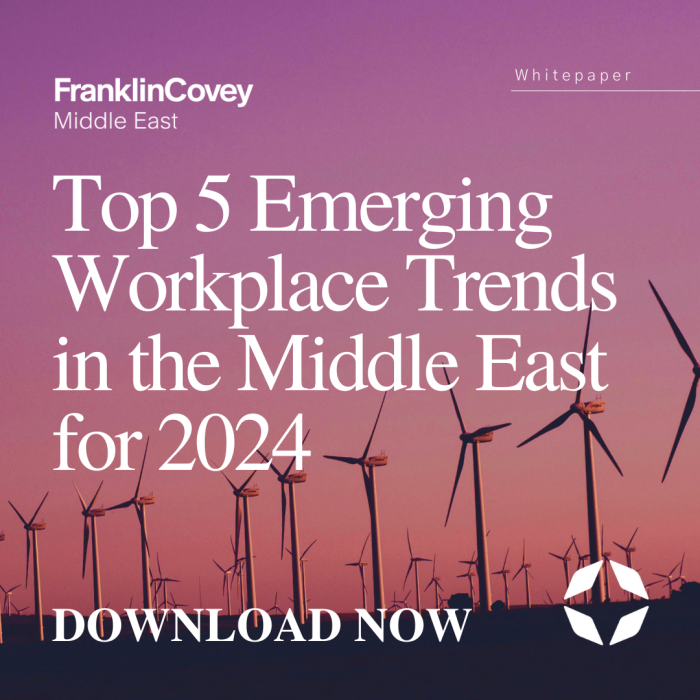
Top 5 Emerging Workplace Trends in the Middle East for 2024
Free Whitepaper
In 2024, workplaces in the Middle East are witnessing transformative shifts in leadership, skills development, sustainability, employee well-being, and change management. These trends are reshaping the way organizations operate and interact with their employees. Here are the top five emerging workplace trends set to define the employee experience and people development in 2024.
1. Leadership at Scale: Developing Leaders at All Levels
Leadership development is becoming a priority across all organizational levels. According to a PwC survey, 73% of workers in the Middle East see leadership skills as critical for their careers over the next five years, with 83% confident in their employers’ support for leadership development.
Key Insights:
- Widespread Leadership Programs: Organizations are focusing on developing leadership skills not just among top managers but at every level, recognizing the need for adaptability and skill-building in a digitally evolving marketplace.
- Strategic Focus: The rise in demand for leadership development is driven by large-scale mega projects and developmental initiatives, particularly in the Gulf countries.
2. Upskilling is a Necessity
The rapid pace of technological advancements and job market shifts necessitates continuous upskilling. According to a recent PwC report, 52% of individuals in the Middle East believe their jobs will change significantly in the next five years, requiring new skills and capabilities.
Key Insights:
- Assessing Skill Gaps: Identifying and addressing skill gaps through surveys, performance reviews, and skill assessments is crucial.
- Training Plans: Developing structured training plans tailored to address identified skill gaps, including workshops, online courses, seminars, and mentorship programs.
- Continuous Learning: Fostering a culture of continuous learning to ensure employees stay current and competent.
3. Green Skills for the Future
With global commitments to achieving net-zero carbon emissions by 2025, the importance of green skills is rising. HR departments play a pivotal role in engaging employees in sustainability practices.
Key Insights:
- Sustainability Focus: Employees in the Middle East are showing a greater interest in learning environmentally beneficial skills compared to their global counterparts.
- HR’s Role: Implementing training programs, communication strategies, and creating a supportive environment to integrate sustainability into the company’s ethos.
4. Prioritizing Employee Well-being
In 2024, businesses are increasingly focusing on the mental and physical well-being of their employees alongside productivity. Creating an inclusive environment where every employee feels valued is essential.
Key Insights:
- Wellness Programs: Companies are actively investing in comprehensive wellness programs that address both mental and physical health needs.
- Work-life Balance: Emphasizing work-life balance and creating a safe space for the expression of ideas and feedback without fear of repercussion.
5. Mastering Change in the Workplace
Effective change management is crucial for navigating the uncertainties of the modern workplace. Leadership involves actively involving employees in the change process, transforming uncertainty into opportunity.
Key Insights:
- Change Patterns: Understanding the predictable pattern of change and building the skills to navigate it successfully allows organizations to manage their reactions and responses.
- FranklinCovey’s Change Model: This model helps organizations move through common zones of adopting change, achieving acceptance, ownership, and new levels of innovation.
From the archive
Explore all of our personal and professional development resources for individuals and organizations.









